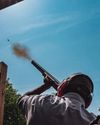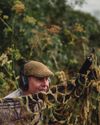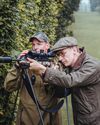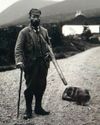
Introduced in 1955, the .243 Winchester cartridge is reckoned to be the most popular 6mm round in use today for hunting medium-sized game and for target shooting. Designed by necking-down a .308 Win case to take a .243in (6.17mm) bullet, the round is capable of achieving high velocities thanks to the large powder capacity of its case and the fact it shoots flat out to most ranges at which one might expect to engage live quarry. It is not surprising that BASC has estimated that nearly 14% of all rifles held on certificate in Britain — around 60,000 — are chambered for the .243 Win cartridge.
It is a forgiving round with low recoil. I moved to it from .308 for my everyday stalking some years ago because the lack of recoil enabled me to watch the reaction to the shot so much more easily than with the .308 cartridge, which I now reserve for larger species such as red deer.
But there’s a problem. As we all know, a wholesale switch to non-lead ammunition is now taking place, and because copper is less dense than lead, the smaller centrefire calibre bullets must be longer if they are to approach a weight comparable to that of their lead counterparts. Furthermore, longer bullets require a faster twist rate if they are to be stabilised in flight, making the shooting of a .243 bullet from a 1 in 10 twist rate barrel potentially marginal in terms of accuracy at range.
Lighter bullets must also be driven faster if they are to achieve the same muzzle energy as heavier ones, and this presents a problem for manufacturers trying to produce a round that meets the muzzle energy requirements of UK deer legislation.
This story is from the July 26, 2023 edition of Shooting Times & Country.
Start your 7-day Magzter GOLD free trial to access thousands of curated premium stories, and 9,000+ magazines and newspapers.
Already a subscriber ? Sign In
This story is from the July 26, 2023 edition of Shooting Times & Country.
Start your 7-day Magzter GOLD free trial to access thousands of curated premium stories, and 9,000+ magazines and newspapers.
Already a subscriber? Sign In

United we stand
Following United Utilities' decision to end grouse shooting on its land, Lindsay Waddell asks what will happen if we ignore our vital moors

Serious matters
An old gamebook prompts a contemplation on punt-gunning

They're not always as easy as they seem
While coneys of the furry variety don't pose a problem for Blue Zulu, he's left frustrated once again by bolting bunnies of the clay sort

Debutant gundogs
There's lots to think about when it comes to making the decision about when to introduce your dog to shooting

When the going gets rough
Al Gabriel returns to the West London Shooting School to brush up on his rough shooting technique

The Field Guide To British Deer - BDS 60th Anniversary Edition
In this excerpt from the 60th anniversary edition of the BDS's Field Guide To British Deer, Charles Smith-Jones considers the noise they make

A step too far?
Simon Garnham wonders whether a new dog, a new gun and two different fields in need of protection might have been asking too much for one afternoon's work

Two bucks before breakfast
A journey from old South London to rural Hertfordshire to stalk muntjac suggests that the two aren't as far detached as they might seem

Stalking Diary
Stalkers can be a sentimental bunch, and they often carry a huge attachment to their hill

Gamekeeper
Alan Edwards believes unique, private experiences can help keepers become more competent and passionate custodians of the countryside